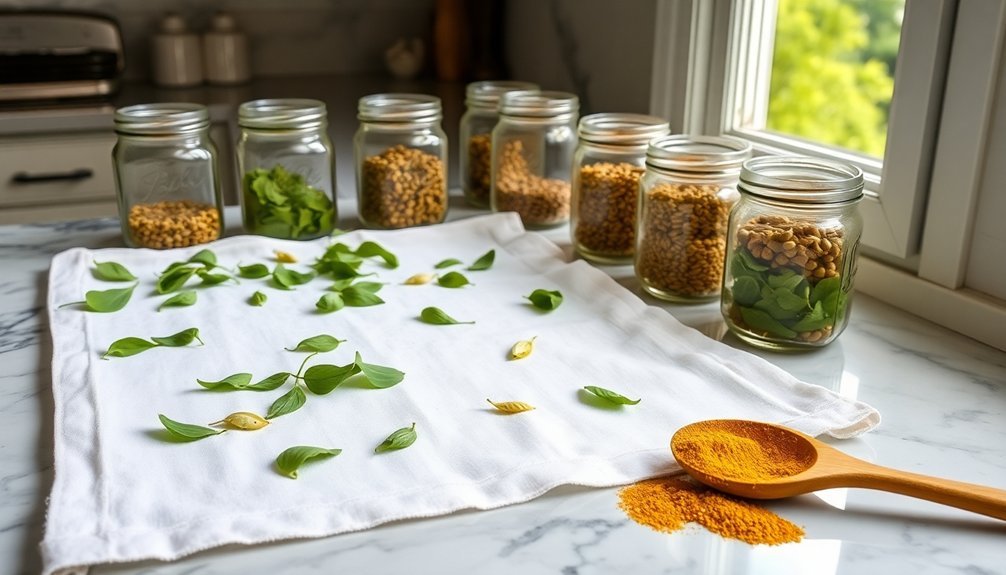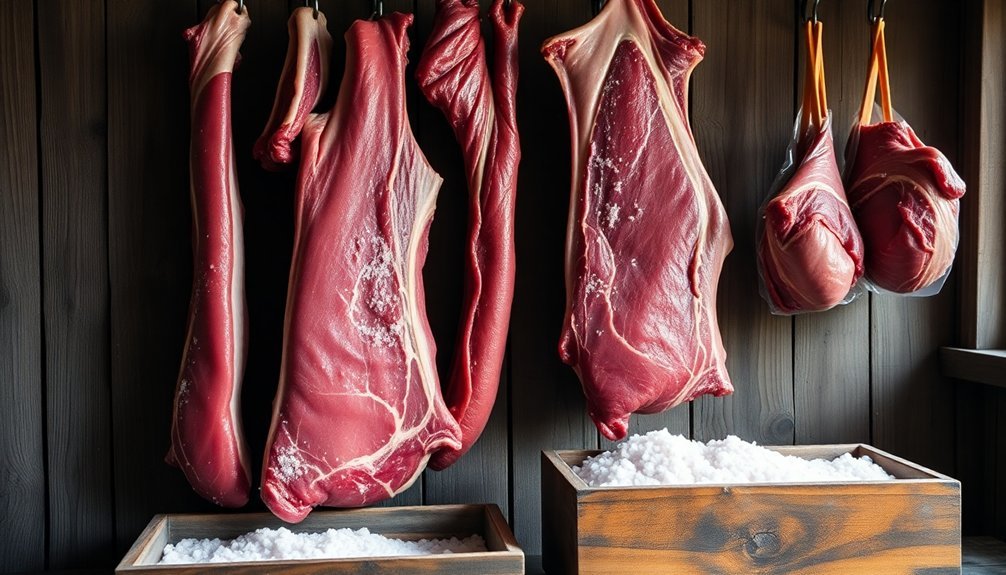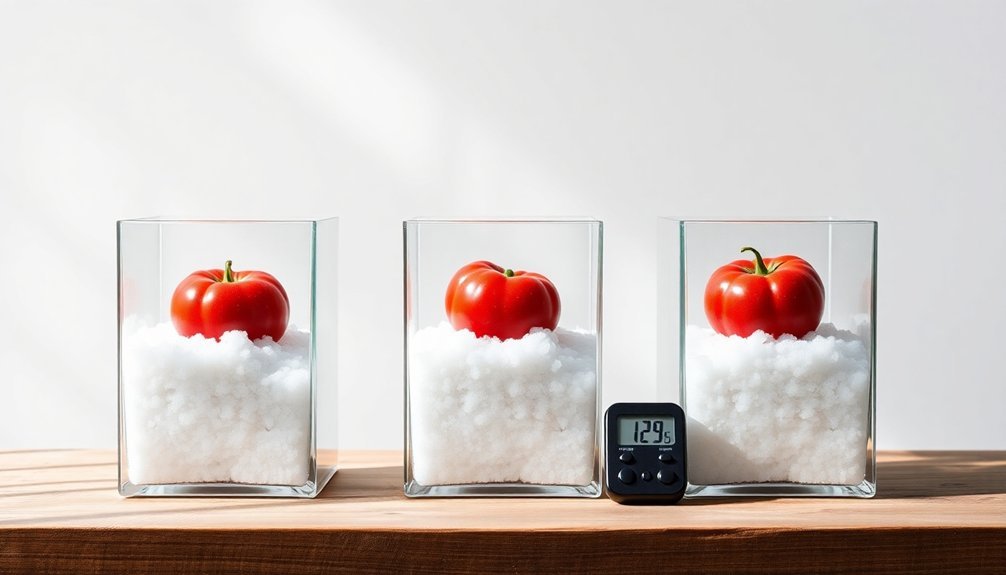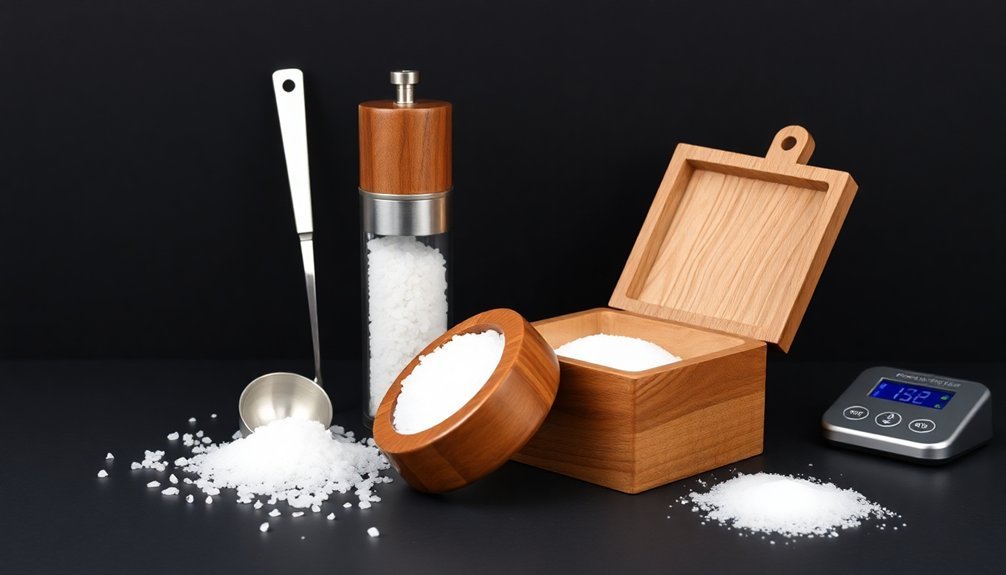To preserve food with fenugreek at home, start by selecting golden-brown fenugreek seeds and cleaning them thoroughly with hot water. You'll want to roast the seeds until dark brown to enhance their natural preservative properties and reduce bitterness. Store your fenugreek-preserved foods in airtight glass containers or food-grade plastic, keeping them in a cool, dry place below 70°F with humidity under 60%. Combine fenugreek with other preservation methods like salt curing, pickling, or fermentation for better results. You can maximize your food's shelf life by learning the proper techniques and avoiding common storage pitfalls.
Fenugreek Storage Basics

You'll find three main storage methods to choose from: pantry storage for short-term use, refrigeration for medium-term storage, and freezing for long-term preservation.
Store your fenugreek seeds in airtight containers to maintain optimal freshness.
To maximize shelf life, add silica gel packets or oxygen absorbers to your storage containers.
Remember to check your fenugreek regularly for signs of spoilage, such as musty odors, mold, or color changes.
When stored properly, your fenugreek can last up to 2-3 years, though whole seeds typically outlast ground versions.
Preparing Seeds for Food Preservation
A successful preservation process starts with properly preparing your fenugreek seeds. You'll need to select golden-brown seeds that are free from debris and show no signs of spoilage. Before you begin, clean the seeds thoroughly to remove dirt and impurities, making certain to use only dry utensils to prevent unwanted moisture. Hot tap water can be used to effectively clean the seeds and remove any stickiness.
To maximize the preservative qualities of fenugreek, you'll want to roast the seeds until they turn dark brown. This step reduces bitterness and enhances flavor, making them more effective for preservation. After roasting, you can either leave them whole or grind them into a powder, depending on your preservation method.
When preparing the seeds for preservation purposes, you'll need to verify all your storage containers are completely dry. If you're creating a preservative paste, mix the ground seeds with water only when you're ready to use them.
You can combine fenugreek with other spices to create preservation blends for pickling, brining, or making spiced butters. Remember to handle and store your prepared seeds in a cool, dry place away from light and heat sources to maintain their preservative properties.
Natural Food Preservation Methods

Natural preservation methods offer powerful ways to extend food's shelf life while maintaining its nutritional value. You'll find that combining traditional techniques with plant-based preservatives creates an effective preservation strategy. When using fenugreek alongside other natural methods, you're tapping into time-tested preservation practices that'll keep your food fresh longer.
You can enhance your preservation efforts by incorporating plant extracts and essential oils alongside fenugreek. Try combining these with traditional methods like salt curing, pickling, or dehydrating to maximize effectiveness. Don't forget that fermentation creates natural preservatives through organic acids, while sugar preservation works well for fruits. These methods help prevent harmful foodborne bacteria from developing in your preserved foods.
| Method | Benefits | Best Used For |
|---|---|---|
| Salt Curing | Controls bacteria | Meats, fish |
| Fermentation | Creates probiotics | Vegetables |
| Dehydration | Removes moisture | Herbs, fruits |
| Plant Extracts | Natural antimicrobial | All foods |
| Sugar Preservation | Prevents spoilage | Fruits, jams |
For best results, you'll want to combine multiple preservation techniques. Consider using fenugreek with other natural preservatives like tea polyphenols or chitosan. These combinations won't just preserve your food – they'll add nutritional benefits while preventing bacterial growth and maintaining flavor.
Long-Term Storage Solutions
Proper storage transforms well-preserved food into a long-lasting resource for your pantry. To maximize your fenugreek's preservation potential, you'll need to focus on temperature, humidity, and container selection.
Store your fenugreek seeds in a cool environment between 50-70°F, keeping humidity below 60%. You'll want to choose airtight containers like glass jars with tight-fitting lids or food-grade plastic containers.
Don't use metal containers, as they can react with the seeds' natural oils. For bulk storage, consider food-grade buckets with gamma seal lids.
If you're planning for extended preservation, refrigeration and freezing are your best options. Place seeds in freezer-safe bags or containers, removing as much air as possible before sealing.
You'll find that frozen seeds can maintain their quality for several years. For added protection, include silica gel packets or oxygen absorbers in your storage containers.
Remember to store whole seeds rather than ground powder, as they'll last longer. Check your stored fenugreek regularly for changes in aroma, appearance, or texture.
With proper storage techniques, you can expect your fenugreek seeds to maintain their quality and nutritional value for up to 2-3 years.
Combining Fenugreek With Other Preservatives

Through strategic combinations, fenugreek can work synergistically with other preservatives to enhance both flavor and shelf life.
You'll find that combining fenugreek with spices like cumin, coriander, and turmeric not only creates robust flavor profiles but also extends preservation capability through their collective antimicrobial properties.
- Mix fenugreek with turmeric powder to create a powerful antioxidant blend that protects stored foods from oxidation.
- Combine fenugreek seeds with rock salt for pickling vegetables, leveraging their natural emulsification properties.
- Add fenugreek to ginger and cinnamon in preserving chutneys and condiments for enhanced shelf stability.
- Incorporate ground fenugreek with dried herbs like basil or oregano in spice blends for long-term storage.
When preserving foods, you can take advantage of fenugreek's natural gum properties by combining it with other preservatives.
This helps stabilize mixtures and maintain consistent texture over time. The seed's ability to trap gases and increase viscosity makes it particularly effective when combined with fermentation-based preservation methods.
You'll get the best results by using sprouted fenugreek seeds, as they offer increased nutritional value and stronger preservation properties.
Troubleshooting Common Preservation Problems
When using fenugreek as a preservative, you'll need to watch for signs of spoilage like rancid odors, discoloration, or unusual textures that could indicate your preservation method isn't working effectively.
You can prevent moisture damage by storing your preserved foods in airtight containers away from heat sources and areas with high humidity levels above 60%.
To fix storage container issues, switch to food-grade buckets with gamma seal lids or vacuum-sealed bags, and always use clean, dry utensils when handling your preserved items.
Identifying Signs of Spoilage
Successfully preserving food with fenugreek requires vigilance in spotting potential spoilage before it compromises your entire batch.
You'll need to check your preserved foods regularly for any signs that might indicate they're no longer safe to consume.
Watch out for these critical warning signs that indicate spoilage:
- Unpleasant odors or mushy textures in your fenugreek-preserved foods suggest bacterial growth and require immediate disposal.
- Visible mold growth of any color (white, blue, black, or green) on the surface or under jar lids means the batch is unsafe.
- Bulging or loose lids, along with bubbling or spurting when opened, indicate dangerous bacterial activity.
- Cloudy liquid or unusual color changes, especially darkening at the top of jars, can signal chemical spoilage.
Don't attempt to salvage food showing these signs by removing affected portions – if you spot any of these indicators, it's safest to discard the entire container.
When preserving with fenugreek, guarantee you're maintaining proper processing temperatures, using correct headspace, and following recommended sealing procedures to prevent spoilage issues from developing.
Preventing Moisture Damage
Proper moisture control stands at the heart of effective food preservation with fenugreek. You'll need to maintain humidity levels below 60% and store your fenugreek seeds in an environment between 50-70°F (10-21°C) to prevent moisture damage. If you're not careful, excess moisture can quickly compromise your preservation efforts.
To protect against moisture damage, you'll want to use airtight containers that create an effective barrier. Choose glass jars with tight-fitting lids, food-grade plastic containers, or vacuum-sealed bags. Before storing your seeds, make sure your containers are completely dry to prevent unwanted moisture buildup. You can add silica gel packets to your storage containers as an extra precaution against moisture absorption.
For long-term storage, consider refrigeration or freezing options. If you're freezing your fenugreek seeds, use freezer-safe containers and remove as much air as possible before sealing.
Don't forget to label your containers with dates, and always use clean, dry utensils when handling the seeds. Remember to check your stored fenugreek regularly for any signs of moisture damage, and avoid storing them near heat sources or in direct sunlight, as these conditions can create unwanted condensation.
Fixing Storage Container Issues
Three common storage container issues can derail your fenugreek preservation efforts: faulty seals, inappropriate containers, and contamination from previous use. You'll need to address these problems quickly to maintain the quality of your preserved fenugreek seeds.
To fix seal-related issues, inspect your containers for cracks, chips, or warping that might compromise the airtight seal. Clean the rim thoroughly before sealing, and replace any damaged lids or gaskets immediately.
If you're dealing with inappropriate containers, switch to proper glass jars or food-grade plastic containers that offer sufficient protection against air and moisture.
- Check seals regularly for signs of wear or damage
- Replace containers that have absorbed strong odors
- Leave adequate headspace when filling containers
- Test container seals by inverting them briefly
If your containers have retained odors from previous use, don't try to salvage them for fenugreek storage. Instead, dedicate new, clean containers specifically for your fenugreek preservation.
For best results, consider using vacuum-sealed containers or bags, which effectively eliminate air exposure and extend shelf life. Remember to monitor your stored fenugreek regularly for any signs of contamination or deterioration.
Frequently Asked Questions
Can Fenugreek Seeds Be Used to Preserve Dairy Products Naturally?
Yes, you can use fenugreek seeds' natural anti-microbial properties to preserve dairy products. Just create an extract-coated wrapping material by soaking ground seeds in water, and use it to wrap your dairy items.
Does Fenugreek Affect the Taste of Other Spices During Preservation?
You'll need to store fenugreek separately as it can transfer its strong, maple-like flavor to other spices. Using airtight containers and keeping spices apart prevents unwanted flavor mixing during preservation.
Are Sprouted Fenugreek Seeds Better Preservatives Than Regular Seeds?
No, unsprouted fenugreek seeds are actually better preservatives than sprouted ones. While sprouted seeds have higher nutrients, they're more perishable and won't preserve your food as effectively as whole, regular fenugreek seeds.
Can Fenugreek Powder Be Used Instead of Whole Seeds for Preservation?
Yes, you can use fenugreek powder instead of whole seeds for preservation. While it's more convenient to apply, it won't last as long in storage. It's especially effective when mixed into solutions for coating materials.
Will Preserved Foods With Fenugreek Maintain Their Nutritional Value Longer?
Yes, you'll find that fenugreek helps maintain food's nutritional value longer due to its antioxidant properties. When you store it properly in airtight containers, it can preserve both its own and food's nutrients effectively.
In Summary
You've now learned several effective ways to use fenugreek as a natural food preservative at home. Whether you're using whole seeds, powder, or combining it with other preservation methods, you'll find this versatile spice can help extend your food's shelf life. Remember to store your preserved items in a cool, dark place and check them regularly for best results. Start with small batches until you're comfortable with the process.





Leave a Reply